
(Artist: Daniya Ahsan)
Hamad Mobeen, UK
Current scientific concepts of the Soul
With the increasing number of people inclined towards atheistic influences, the concept of the soul seems to be a fading reality, only appreciated by those who consider the universe to be more than a mere collection of atoms and molecules. Professor Francis Crick collaborated with James D. Watson to discover the molecular structure of DNA (they would go on to secure the Nobel Prize in Medicine in 1962). He writes in the opening chapter of his book, The Astonishing Hypothesis: The Scientific Search for the Soul:
“The Astonishing Hypothesis is that “You,” your joys and your sorrows, your memories and your ambitions, your sense of personal identity and free will, are in fact no more than the behaviour of a vast assembly of nerve cells and their associated molecules. As Lewis Carroll’s Alice might have phrased it: “You’re nothing but a pack of neurons.” This hypothesis is so alien to the ideas of most people alive today that it can truly be called astonishing.” (1994). The Astonishing Hypothesis: The Scientific Search for the Soul. Sydney: Simon & Schuster. p. 3)
This proposition handsomely sums up the current scientific and philosophical view on human consciousness and the “mind,” which has increasingly gained sway in recent decades. It not only seeks to strip the soul of anything unmaterialistic or metaphysical, but asserts that all of human experience is no more than a series of subjective “illusions” manufactured without objective direction by the brain in order to compute the information fed to it. A human being, thus, may be regarded as a sophisticated body composed of matter and molecules which, when decomposed into dust and dirt, leaves absolutely no traces of itself. Beyond opposing the view of all major faiths on the soul, this hypothesis does something infinitely more sinister. It fundamentally degrades human values to such dangerously inconsequential levels that life itself becomes essentially meaningless.
Science is the systematic study of the universe rooted primarily in observing and investigating the natural world. As such, it tends to explain all sorts of phenomena in natural ways – and rightly so. The mind and human consciousness, despite being an intrinsic part of human experience, are yet as strange phenomena for us to fully comprehend as they were for our ancestors. Consciousness is, at times, seen as inherently subjective for natural philosophy or science to ever empirically examine. Recent studies on the brain and in the fields of psychology led scientists to discover principles of human consciousness which highly promoted the idea that all conscious experiences are based on the neuronal activities of the brain. Such studies eventually gave rise to hypotheses suggesting that humans either lack a soul or, more precisely, do not require one as the root of their cognitive experiences, as these are thought to arise from the intricate and minute neural interactions within the brain. Why should one believe in a “supernatural” soul when science is on the verge of providing a more rational and natural solution, argued some empiricists?
However, as the relatively budding realms of neurology emerged, the question of the soul was once again not so simple. Doing away with the soul entirely proved to be more difficult than many had thought, and even today, human consciousness remains a great mystery, even against the bleeding edge of science.
Contrary to current scientific trends, Islam has taken a more “dualistic” approach in defining and explaining the reality of human conscious experiences. The soul is an essential – if not the most integral – part of it.
Do we have a soul?
While most of those who believe in the human soul base their belief on some religious doctrine, yet day-to-day conscious experiences also bolster this claim. After all, we find an “I” within us that thinks, understands, feels and makes decisions and this governing “self” is very different from everything else we experience. It has a sense of uniqueness, a form of identity and a will, which collectively forms human experience as we know it. For many, the human mind – or consciousness – is a direct product of the human soul.
The Second Caliph of the Ahmadiyya Muslim Community, Hazrat Mirza Bashiruddin Mahmud Ahmad (ra), summarized the concept of the soul and its interaction with the human self in a most fascinating manner. He explained:
“There is a distinct difference between the soul (Rūḥ) and the conscious self (Nafs). The soul is an independent entity, whereas the Nafs is the name of an active, functional force. The soul operates by making use of the human brain as its medium. When the soul’s effects take on a specific form within the brain, that is when it is referred to as the Nafs, or conscious self.
This can be roughly illustrated by the example of an old telegraph system: just as the sender (the soul) activates the telegraph wire (the brain), and in doing so, his thoughts begin to appear and be expressed on the receiving end, so too does the soul activate the brain, giving rise to the conscious self.
In this analogy, the soul is akin to the operator, the brain is the telegraph apparatus, and the specific meaning or message that emerges as a result is comparable to the Nafs. However, this analogy is not entirely complete. It merely offers a partial understanding of the concept — and there are certain shortcomings in it.” (Translated by author from original Urdu) (Farmudaat-e-Musleh Mau’ud (ra) – Darbaada Fiqhi Masaail, p. 5-6)
The Soul can be comprehended by Divine Guidance only
When one dives into the complexity of the soul, its enigmatic characteristics overwhelm human intellect, and our current understanding of science is no exception. The realm of spiritual sciences views the human soul from another fascinating perspective. For instance, Hazrat Mirza Ghulam Ahmad (as), the founder of the Ahmadiyya Muslim Community, writes:
“There are four things that the human intellect can never fully comprehend:
Firstly, God Almighty. Secondly, the soul. Thirdly, the Angels and fourthly, Iblis. Whosoever believes in God Almighty and in His Divine attributes, it is incumbent upon him to believe in these three things as well: the Soul, Angels, and Satan.” (Translated by author from original Urdu) (Malfuzat, Vol. 3, pp. 312-313)
The mystery of the soul is truly baffling. The natural philosopher seeks to uncover it but fails by virtue of the limitations of human faculties. Not every existence is of the same kind. Not every existence has the same properties and attributes. An investigator is required to use the tools and means appropriate to the nature of the thing under study. If the ways and methods used to investigate a matter do not correspond to the nature of the subject, the results will never be very fruitful. Understanding the limits of human reasoning and intellect helps in finding satisfactory answers to questions beyond their scope. Where human reason fails, other human faculties must come into play.
The Holy Qur’an profoundly states:
وَيَسْأَلُونَكَ عَنِ الرُّوحِ قُلِ الرُّوحُ مِنْ أَمْرِ رَبِّي وَمَا أُوتِيتُم مِّنَ الْعِلْمِ إِلَّا قَلِيلًا
“And they ask thee concerning the soul. Say, ‘The soul is by the command of my Lord; and of the knowledge thereof you have been given but a little.’” (Chapter: 17, Verse: 86)
It is evident that the Holy Quran describes the soul as an existence but its enigmatic verities are certainly past the ken of human understanding. Nevertheless, there are many who argue the existence of the soul from the effects it has on us.
The Soul affects every single human life
The principle of causality has always played an important role in the development of human knowledge and is indispensable in understanding the proposition that the soul is indeed an entity that exists outside the realm of any deterministic physical systems. If the cause of an effect is yet undetermined, its very existence is not compromised. An effect can never cause itself, as many philosophical greats have argued. The cause may be debatable, but its existence stands robust and unthreatened; otherwise human logic, which itself heavily relies on the experiences of cause and effect, would fall into the weltering void of circular thinking.
This basic principle has also been elaborated by the Promised Messiah (as) in the following words:
“If we observe carefully, we find that the entire universe is bound together in a system of cause and effect. This system is at the root of all knowledge. No part of creation is outside this system. Some things are the roots of others and some are branches. A cause may be primary or may be the effect of another cause, and that in its turn may be the effect of still another cause, and so on. Now, it is not possible that in this finite world this pattern of cause and effect should have no limit and should be infinite. We are compelled to acknowledge that it must terminate with some ultimate cause. The ultimate cause is God.” (The Philosophy of the Teachings of Islam, p. 88)
Free will and Reasoning
Whether we approach human consciousness and cognitive behaviour from a subjective perspective or an objective one, free will consistently emerges as a fundamental attribute of human existence — one that cannot be overlooked or dismissed. Free will is not a phenomenon of chance, randomness, or any other method of probabilistic calculations. Active free will is the ability of humans to make choices and decisions at any given point in time. It is the wilful choice – the volition – to either select the colour blue or green, for instance, or select them both together or neither of them, as many times as one wishes, or never at all. It gives meaning to life and distinguishes humankind from every other type of creation. The very foundations that science is based on, namely the faculty of observation and reasoning, rely on the principles of free will. Free will is not an illusion nor a sensory feed that has been generated by neural interactions in the brain. Man has been bestowed with the inherent ability to make choices at will and reject others if he so desires. The Promised Messiah (as) has explained this principle in the following manner:
“He [God] first invested man with the faculty of observation and then provided him with the means for reflection. These are indeed the very divine favours on account of which man’s star of fortune shines forth and sets him apart from animals.” (Barahin-e-Ahmadiyya – Part Four, p. 28)
The basis of our judicial system is rooted on the premise that man is able to act wilfully at a particular instance. In the absence of free will, religious doctrines regarding the Day of Judgement, the concept of good and evil and the very purpose of human life, as per the teachings of Islam, would cease to exist. Life would be essentially lifeless. However, despite cultural differences, people predominantly tend to reject the notion that they live in a deterministic world without free will. This inherent awareness of being in control of one’s life is not merely a by-product of a particular brain region creating the sensation of free will as many philosophers or scientists would describe it. Rather, it is a quality of the soul which lies in the sphere of the metaphysical.
Those who propose that free will is indeed a spurious experience of the mind generated by otherwise blind neurological interactions, are bound to proclaim so because they see the universe and all its constituents to be nothing more than determinable and measurable pieces of matter which are governed by deterministic laws of nature and which just happen to exist by chance. They have taken this stance because current scientific investigations show that all natural phenomena interact and operate according to the laws of nature which are well established and verifiable. Hence, free will, according to them, must also be a product of some molecular interactions. However, the active existence of free will profoundly endorses the belief that man possesses a superior kind of existence (i.e. the soul) which resides in a sphere beyond the empirical universe.
Free will is beyond the deterministic realm of our universe
The famous philosopher René Descartes reasoned that the very act of a person doubting his own existence is indicative of his actual existence, because there is surely something which is doing the doubting. He encapsulated this very reasoning in the well-known phrase “I think, therefore I am,” implying thereby that the very act of thinking, doubting, reasoning and rationalizing gives human beings their character and meaning. In his 1971 book, Socrates, Professor W.K.C. Guthrie of the University of Cambridge described how Socrates considered the human body to be a toll that is controlled by the psyche. He described how, in one of the dialogues, Socrates expresses his belief that:
“… in speaking of a man we mean something different from his body – that, in fact, which makes use of the body as its instrument. There is nothing that this can be except the psyche, which uses and controls … the body.” (Guthrie, W. K. (1971). Socrates. Cambridge: Cambridge University Press. p. 152)
Even Professor Stephen Hawking recognizes that a lack of free will would present an enormous problem for the scientific method and the study of science. In his popular book, A Brief History of Time, he writes:
“Now, if you believe that the universe is not arbitrary, but is governed by definite laws, you ultimately have to combine the partial theories into a complete unified theory that will describe everything in the universe. But there is a fundamental paradox in the search for such a complete unified theory. The ideas about scientific theories outlined above assume we are rational beings who are free to observe the universe as we want and to draw logical deductions from what we see. In such a scheme it is reasonable to suppose that we might progress ever closer toward the laws that govern our universe. Yet if there really is a complete unified theory, it would also presumably determine our actions. And so, the theory itself would determine the outcome of our search for it! And why should it determine that we come to the right conclusions from the evidence? Might it not equally well determine that we draw the wrong conclusion? Or no conclusion at all?” (Hawking, S. W. (1998). A Brief History of Time. New York: Bantam Books.)
Sir Roger Penrose, Nobel Laureate in Physics 2020, has also questioned the problem of free will, describing it to be beyond the capabilities of computers, agreeing thereby that humans are able to perform non-computational thinking that cannot even in principle result from operations defined by scientific laws. He also admits that the phenomenon of conscious awareness is certainly very far from deterministic science. He writes:
“A scientific world-view which does not profoundly come to terms with the problem of conscious minds can have no serious pretensions of completeness. Consciousness is part of our universe, so any physical theory which makes no proper place for it falls fundamentally short of providing a genuine description of the world. I would maintain that there is yet no physical, biological, or computational theory that comes very close to explaining our consciousness and consequent intelligence.
“There is relevance, also, to the question of ‘free will’… might there be something that is beyond chance influences – a separate ‘self’ that has a profound role in controlling our actions? I believe that we are very far from an answer to this question. As far as the arguments of this book go, all that I could claim with any confidence would be that whatever is indeed involved must lie in principle beyond the capabilities of those devices that we presently call ‘computers’.” (Penrose, R. (1994). Shadows of the Mind: A Search for the Missing Science of Consciousness. New York, Melbourne, Oxford: Oxford University Press.)
Don’t miss Part II of the article here
About the author: Hamad Mobeen is a graduate of Jamia Ahmadiyya Canada and a missionary of the Ahmadiyya Muslim Community.



Such an amazing article. There isnt much literature on this topic in the modern world. Eagerly waiting for part 2.
Great!